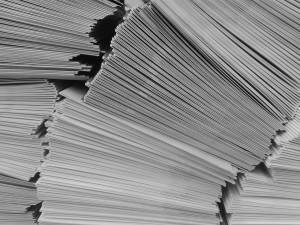Not All Financial Statements
Need to be Retained Indefinitely
We all have filing cabinets and boxes of statements and records that we retain … “just in case”. How long does one really need to retain paper statements, such as 401(k) statements, credit card statements, or transaction receipts?
Most paper files do not need to be retained for more than a few years or an income tax filing cycle. Some people maintain paper files for much longer than necessary, says Darren Zagarola, a CPA and financial advisor with EKS Associates in Princeton, N.J. Here are the recommended holding periods for 22 different types of personal records1:
- Non-Deductible IRA Contributions – Maintain indefinitely or until the money is withdrawn from the IRA.
- Auto Records – Maintain as long as you own the car.
- Warranties – Keep as long as you own the product; shred once the product has been discarded
- Home Repairs – Maintain as long as you own the property, but no less than 10 years because of warranty and workmanship guarantees
- Investment Documents – Capital gains and 1099 forms should be maintained for seven years with the corresponding tax return. Confirmations of trades in non-retirement accounts should be maintained indefinitely or until the asset is sold in order to determine the cost basis and related capital gain on the sale of the asset. Then they should be included with the tax return support for the year of the sale. Prospectus and proxy information can be shred or discarded immediately (after reading, of course).
- Tax Returns & Supporting Documents – The general rule is seven years. Keep a scanned copy forever. The IRS has three years to audit a tax return; however, under-reported income greater than 25% has a six-year statute of limitation; fraud has no time limit.
- Satisfied Loans – Maintain for seven years.
- Medical – Premium insurance statements, doctor’s bills, prescriptions, and hospital bills should be maintained for five years from the date of service. If deductible, maintain a copy with your tax return.
- Insurance – Keep Home/Auto/Umbrella insurance records for five years or until the asset is sold, whichever is less.
- 401(k) Statements – Shred quarterly statements once the annual summary arrives. Maintain annual summaries until the account is closed.
- Charitable Contributions – Maintain receipts and acknowledgement letters with applicable tax returns.
- Bank Statements – Maintain three months of bank statements if you’re planning to apply for a mortgage. Otherwise, shred the statement once the checkbook has been balanced. Should you require them, banks will furnish copies of past statements upon request.

- Utility Bills – Keep bills for three months unless you are writing them off for tax purposes.
- Credit Card Statements – Maintain three months of statements.
- ATM Receipts – Shred once the checkbook is balanced.
- Canceled Checks – Keep until statement is received and reviewed. If business related, maintain for seven years.
- Credit Card Receipts – Keep until statement is received and reviewed. If business related, maintain for seven years.
- Pay Stubs – If year-to-date information is reflected on the most recent pay stub, individual statements throughout the year are not needed. Save the most recent pay stub only until your checkbook has been balanced. If you are planning to apply for a mortgage, three to six months of history may be requested by some mortgage companies
- Monthly Bills – Shred once payments clear on the bank statement. Proof of purchase for larger items should be maintained for insurance reasons.
- Mortgage – Maintain as long as the mortgage is open. Once paid off, maintain for seven years.
- Home Purchases – Purchase price of home and documentation of capital improvements, such as a deck or a roof repair. Maintain until the home is sold.
- Permanent Documentation – There are some documents you should never discard. Some examples include: birth certificates, adoption paperwork, education records, professional license records, military records, marriage licenses, divorce decrees, and death certificates.
Many documents are available on-line from the issuing organization. You may also retain many documents by scanning and saving them to a secure media storage device. We recommend scanning all your important/permanent documents.
Email or call us at (719) 630-0600
LPL Financial Representatives offer access to Trust Services through The Private Trust Company N.A., an affiliate of LPL Financial.





